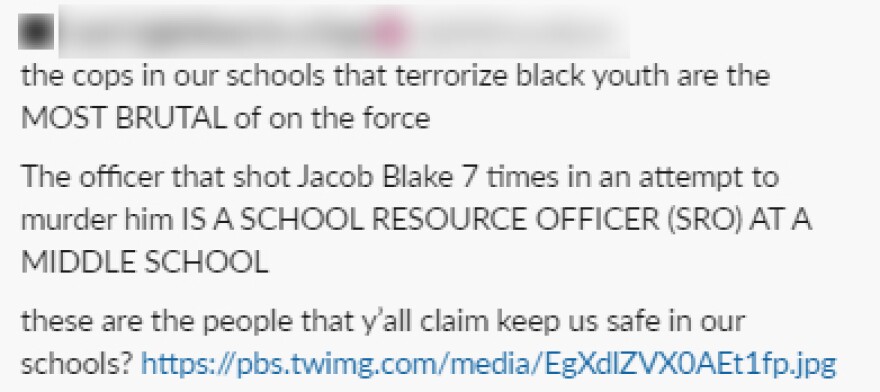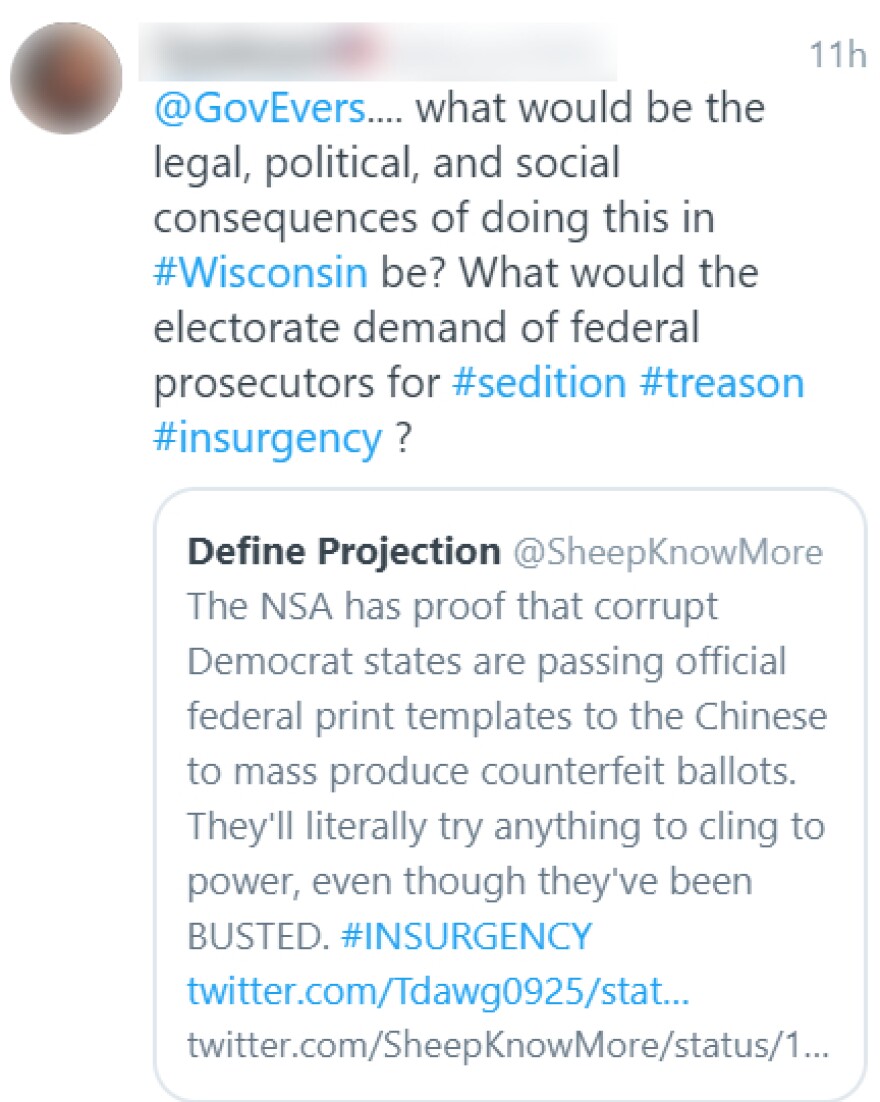Information comes so fast on social media that it’s hard to know what to believe.
Even professionals get confused. Lewis Friedland, a journalism professor at the University of Wisconsin-Madison, has the expertise, but can’t keep up with the overwhelming torrent of articles, memes and cat pics — let alone verify if it’s all based in reality.
“I can’t check the source of everything that comes across my screen,” he said. “I can’t even come close. How on earth can we expect single parents working two jobs to do this? It’s literally impossible in the time and space of a day, given a normal person’s responsibilities.”
As social platforms like Facebook, Twitter and TikTok, and private messaging platforms like WhatsApp and Telegram, have become central parts of everyday life in the United States, falsehoods have flourished and our democracy has been weakened by an inability to agree on basic facts.
In fact, a top intelligence official has warned that spreading disinformation is one of the top strategies being used by foreign adversaries to disrupt the 2020 presidential election, including sowing doubt about the outcome.
“The degree of the crisis can hardly be overstated,” Friedland said. “I’m usually somebody who looks for positive solutions rather than talking about the sky falling in, but we’re starting to get to a point as a society where, at least from the standpoint of shared knowledge and facts — and the shared trust that comes from those things — the sky is starting to fall in.”
Though everyone plays a part in amplifying falsehoods online, it’s not up to each person to clean up the internet. Social platforms will continue elevating emotional posts. Bad influencers will keep spewing toxic content. One thing individuals can do is help family and friends is to stick up for the truth.

It is not uncommon to have a friend, parent or elected representative share an article pushing the "Pizzagate" conspiracy on Facebook, or go on a Twitter diatribe about how COVID-19 contact tracers are spying on them. (They aren’t.)
Even if news consumers know the information is false because they get their information from legitimate sources, knowing loved ones have fallen for propaganda or hyper-partisan content can be highly distressing. (See this toolkit for additional tips.)
Citizens should speak up, even if it isn’t easy, said Leticia Bode, a researcher at Georgetown University who studies the effect of corrections on social media bystanders.
“It’s important to call out misinformation you see on social media because it provides a counter narrative,” she said. “If you imagine a random person scrolling through their social media feed, they have no idea that what they’re seeing is misinformation. If they immediately see a comment saying that it’s not true, that can prevent them from believing it in the first place."
“The research says you should call them out in public,” she said, “because otherwise people are going to think that the misinformation is true, and you have an opportunity to show everyone else that it’s not.”
Corrections are more effective when provided by close friends and family, rather than strangers, Bode said. But it’s a delicate situation: People don’t like being called out in public.
“It’s going to make them uncomfortable, it’s going to make them defensive, and to the extent that you care about furthering that relationship, it can be a dangerous thing to do,” she said. “I think you should tread very carefully in that regard.”
But people can make a difference for those in their circle — even people from high school whose names would have been forgotten if not for Facebook.
Here’s how to fact-check people without burning bridges:
Be kind, empathetic — and diplomatic.
Most people don’t spread falsehoods on purpose. Be civil when offering a correction — especially if it’s directed at a loved one.
“People should be talking to their friends and family,” said Shadanay Urbani, a writer and researcher with First Draft. “If your uncle shared something in the family group chat that you think is problematic or out of context, you should say something. A lot of misinformation circulates among well-meaning people who are just trying to help. If you can confront those people on a personal level, in the shared interest of having better information, that goes really far."

“Don’t blame the individual,” she continued. “Frame things in a way that doesn’t threaten their worldview, and provide reasons why they could have been misled. Instead of saying ‘You’re stupid for believing this vaccine doesn’t work,’ you could say something like ‘I’m concerned that this group is trying to mislead people about vaccines because they’re trying to make money by selling supplements.’”
Joy Mayer, director of Trusting News, a nonprofit that helps journalists earn news consumers’ trust, advises keeping those conversations focused on the information being discussed and avoid being drawn into emotional arguments.
“Using neutral language wherever possible, and not responding to emotion with emotion, can be persuasive,” Mayer said. “Stripping away the emotional and inflammatory language to say, ‘It sounds like what you’re saying or what you’ve heard is X. That contradicts something that I’ve heard. Can we look at that together?’ ”
Challenging a person’s beliefs can be tricky; experts suggest doing it productively, keeping in mind: What is the goal in posting a fact-check? Is it likely to change anyone’s mind, or just contribute to the chaos?
Get facts straight before correcting anyone
If a friend shares something that may not be true on social media, the first instinct may be to jump right into the fray.
But the best advice is to first make sure the information is, in fact, wrong, said Nora Benavidez, a First Amendment and voting rights advocate with PEN America who wrote a tip sheet for correcting friends and family.
“First, before you even think about commenting, try to verify that the content your friend is posting is false. It might not be,” she said. “Before you get into some back-and-forth that escalates or is tense, you want to make sure the content is actually misleading.”
Be discreet
Whether to offer a correction with a public comment or a private message is worthy of careful consideration. Nobody likes feeling duped, and a call-out could invoke a defensive posture, or an argument that could amplify engagement with the post. Not to mention, no one likes to be embarrassed.

“Generally, if something is super fresh and new, and you can confirm that it is misleading or false, it’s better to send a private message,” Benavidez said.
Then again, there’s value in offering corrections that others can see. Use discretion.
Personalize the message
Acknowledging that everyone is susceptible to misinformation can be helpful. Recounting a tale of being fooled by a viral image or a fabricated news story can make the advice more relatable.
Point to expert sources
Whether it’s a public health official, an institution such as the American Medical Association, or an established fact-checking website like Snopes.com, linking to expert sources is a good idea.

Of course, much of the public no longer trusts government and media institutions long considered to be unbiased sources, and there isn’t universal agreement on which experts should be listened to.
“That’s increasingly true even for things that in the past have been relatively consensus-driven and nonpolitical,” Bode said. “That’s a big challenge, and that’s something for people to think about when they’re approaching friends and family: ‘What is a source that this person is going to be persuaded by?’ That may be something you have to decide for yourself because there are so few organizations that everyone agrees are expert sources, at this point.”
Say the truth, and say it again
Don’t restate the falsehood. Repetition is essential to persuasion, so start and finish a correction with the truth. And if somebody else has already offered an accurate correction, go ahead and give one, too.
“That lends more credence to the correction, essentially like putting another tally mark on the side of ‘this is right, that’s wrong,’ ” Bode said.
It’s important to “establish a norm that we care about the truth,” she said, regardless of whether a correction persuades the poster.
Provide context
Rather than simply telling somebody they’re wrong, explain why something is untrue. Give the full narrative version with as much explanatory detail as possible.
Distinguish opinion from falsehood
Emphasize that people are entitled to their opinions, but facts still matter. If somebody is arguing that, say, the coronavirus lockdown was unnecessary, the conversation should stay grounded in reality.
“If you think the coronavirus lockdown was a bad idea, that’s fine — you can have that opinion,” Bode said. “But you can’t say the CDC changed its numbers and that only 6% of attributed coronavirus deaths are actually coronavirus deaths. You don’t get to decide that’s a fact when it’s not a fact.”
Know when it’s a lost cause
Some people are beyond convincing, so don’t get in a shouting match.

“In our research, we find that people who are very high in conspiracy ideation — people who are prone to believe conspiracy theories — no matter what you tell them, they’re not going to be corrected,” Bode said.
If someone is really digging in their heels, or the conversation is escalating from constructive to combative, find a delicate way to extract from the conversation.
“You know the thing — we’ve all seen it happen — where someone won’t see reason or just refuses to acknowledge something,” Benavidez said. “It is really worth your time and energy engaging with someone who won’t go along with you? At that point, you should have an exit strategy like, ‘Here are the resources I use. Good luck.’”
Howard Hardee is a Madison-based journalist who created a misinformation toolkit for consumers funded by the Craig Newmark Philanthropies. He is a fellow at First Draft, an organization that trains journalists to detect and report on disinformation. Wisconsin Watch collaborates with Wisconsin Public Radio, PBS Wisconsin, other news media and the University of Wisconsin-Madison School of Journalism and Mass Communication. All works created, published, posted or disseminated by Wisconsin Watch do not necessarily reflect the views or opinions of UW-Madison or any of its affiliates.




